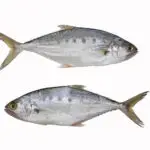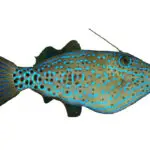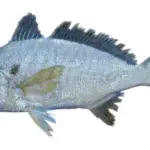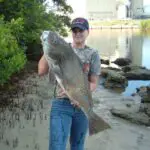Largemouth bass are the most popular gamefish in North America…and we all know they love to eat wild shiners, crawfish, shad, etc…
But what about a mullet? Do largemouth bass eat mullet? Can you really catch a bass on live finger mullet?
In this article, I’m going to answer all of those questions…and you may be quite surprised!
Table of Contents
- Do Largemouth Bass Eat Mullet?
- Does Mullet Work In Freshwater?
- Using Finger Mullet For Bass Bait
- Stocking Ponds With Mullet
- Related Posts
Do Largemouth Bass Eat Mullet?
Largemouth bass have a reputation for eating just about anything that swims, and it is not uncommon for them to eat mullet in waterways where they are present. Mullet can tolerate very low levels of salinity, and swim far up freshwater creeks and canals where largemouth bass inhabit.
Sounds crazy right? After all, mullet is a saltwater fish? Well…yes, sorta…
Mullet are a Euryhaline species, which means they can tolerate a wide range of salinities, including freshwater, brackish water, or saltwater.
Where I live in Florida, we have mullet along the beaches and coast which is pure saltwater…
But we also have mullet in the Indian River Lagoon, which is a very large brackish estuary…
And we have mullet in freshwater creeks, canals, ditches, and ponds, sharing the same water with largemouth bass!

Other coastal states like Georgia, South Carolina, North Carolina, Alabama, Mississippi, Louisiana, and Texas all have populations of striped mullet that may be found in freshwater too.
One of the golden rules of fishing is ‘match the hatch‘…in other words try to imitate the native forage in your area. If you see a creek or river or estuary with mullet…try using them for bass!
And if you cant get your hands on any live mullet, there are plenty of mullet imitation lures out there that work perfectly well for freshwater too.
Check out the Zara Spook, one of the best topwater lures ever made that I have personally caught largemouth bass, tarpon and snook on.
Does Mullet Work In Freshwater?
Mullet are a great choice for both live and dead bait in freshwater due to their thick skin, durability, and high oil (scent) content.
In fact, largemouth bass isn’t the only thing that eat mullet. Did you know that catfish will eat mullet too?
Live mullet or cut mullet is a very common bait for commercial catfishermen who use them on bush hooks, trotlines, and hoop traps to catch tons of catfish in places like Alabama, Louisiana, and Texas.
In South Florida, exotic freshwater water fish such as peacock bass, mayan cichlids, clown knife LOVE to eat live mullet.
If you live in a coastal area where mullet are present…don’t limit yourself to using them only in saltwater.
Try using mullet in your local creek, river, or lake…you might be surprised!
Using Finger Mullet For Bass Bait
The best way to fish finger mullet for largemouth bass is to freeline them with a circle hook.
Hook your finger mullet through the mouth and out the top. Attach a 12″-18″ fluorocarbon leader to a 2/0 circle hook.
Cast it along weed edges, around docks, under bridges or pilings, or anywhere that you think bass are present.
Open your bail, and let the mullet do the work. Allow it to swim freely…and just watch and wait.
(You could also add a cork or bobber to keep you mullet off the bottom which will help reduce it getting snagged)
Chances are if there is a predatory fish in the area like largemouth bass, striped bass, peacock bass, etc… it’s gonna get smashed!
Stocking Ponds With Mullet
Did you know that some folks even stock their private ponds and lakes with mullet?
For example, in Florida, there are no rules or regulations prohibiting the transfer and release of live mullet into your private pond.
(always check the rules and regulations for fish stocking in your area)
Many anglers will go out and cast net live finger mullet, and slowly acclimate them to a freshwater environment by putting them in a large holding tank of 50/50 freshwater and saltwater.
After a few weeks, they release the mullet into their pond. Sometimes acclimation isn’t even necessary if they were caught in freshwater, to begin with.
Mullet are an excellent forage fish for bass, snook, tarpon, and other Euryhaline species. Not to mention they are fun to watch since they often school along the surface and jump.

Growing up in Florida, I’ve been surrounded by saltwater my entire life…and I love sharing my passion with others.
To learn more about why I started Saltwater Mecca, visit the ABOUT page.
Thank you for reading this article. Browse around & have some fun!





